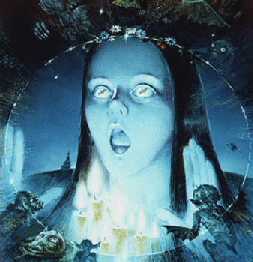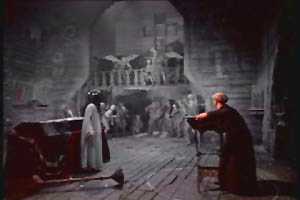

"Nothing scares a Cossack!" With these words young seminarian Khoma Brut attempts to steel himself for a showdown in a church where the forces of evil he has unleashed are awaiting him. Ordered to assist in the salvation of a recently deceased young woman of high standing, Khoma finds that her body has been possessed by a witch he has inadvertently scorned. For three nights the mischievous but simple-minded Khoma must face the wrath of the witch, who summons all the demons within the grip of her power. It is a ritualistic battle of wills that Khoma is ill-equipped to endure, especially because his interests tend toward the more mundane and earthly delights rather than spiritual purity and righteousness.

A relatively faithful adaptation of Nikolai Gogol's 1835 story, Viy, a "full-blooded, genuinely hair-raising supernatural extravaganza" (Michael Brooke, "The Russians Are Coming," Sight and Sound, August 2002), nonetheless stands out as a rare Soviet horror film and has garnered somewhat of an underground status among cult film aficionados, not the least because Gogol's tale provided the basis for Italian shockmeister Mario Bava's film Mask of Satan (aka Black Sunday) as well. As in Gogol's tale, Viy juxtaposes a variety of fairy-tale motifs with the larger themes of conformity and faith versus uncanny urges and desires. But the film's most remarkable achievement lies in the integration of both fantastic and folkloristic elements that culminates in a celebration of the visualizing potential of the cinema. While the film does not follow Gogol's doubtful claim that the story has its origins in Ukrainian folktales, it nonetheless emphasizes its legendary roots and its powerful expression of "the imagination of simple folk." By combining a folkloristic imagination with a boundless enthusiastic foregrounding of special effects as an important element of the film, Ershov and Kropachev, under the supervision of their teacher Ptushko, envision a quasi-religious movie screen, replete with its own iconography of fear. Here cinematic space and the halls of the church converge to become a spectacular site for the projection of our fears and fantasies.
This tribute to both a popular and a cinematic imagination allows Viy to play with a variety of registers from the comic burlesque to the serious parable as it "mixes gothic horror and grotesque animated effects in a proletarian blender and what it lacks in production values it makes up for in its lingering sense of dread" (Kelly Vance, "The Wild, Wild East," East Bay Express, June 1, 2001) and then culminates in a "hilarious mixed-media Walpurgisnacht" (J. Hoberman, "Plastic Fantastic," The Village Voice, Dec. 19-25, 2001). But for all its enthusiastic charm and quaint visual style, audiences schooled in a cinema of suspense and state-of-the-art SFX rather than a cinema of expository and confrontational shock might overlook the more ominous disciplinary elements in Viy. As the icons in the church come alive, Khoma must look into the eyes of the demon Viy in a final confrontation. As if it were a parable of the iconographic powers of the cinema, it is the act of seeing here that becomes the ultimate proof of faith, defying us to believe. The insouciance of the characters in the epilogue thus stands in marked contrast to the fearful humility that a true faith in the power of vision demands.
Konstantin Ershov (1935-1984) was born in Cheliabinsk. He graduated from the Department of Philology at Kiev University in 1958, after which he worked as a set designer and actor in theaters in Kiev. In 1967 he completed the Advanced Courses for Film Directors. He continued to work as an actor, director, and scriptwriter until his death.
| 1960 | The Heirs (actor) |
| 1961 | For Two Rabbits (actor) |
| 1965 | A Spring for the Thirsty (actor) |
| 1967 | Viy (co-directed with Georgii Kropachev) |
| 1968 | On the Eve of Ivan Kupala (actor) |
| 1968 | Name's Day (actor) |
| 1973 | Every Evening After Work (director and scriptwriter) |
| 1976 | Stepanov's Bequest (director and scriptwriter) |
| 1978 | The Man Who Was Lucky (actor, director, and scriptwriter) |
| 1981 | Women Joke Seriously (director and scriptwriter) |
| 1982 | The Rooks (director and scriptwriter) |
| 1986 | Blame the Wedding (scriptwriter) |
Georgii Kropachev (1930) was born in Leningrad, where he graduated from the Repin Art Institute (1954) and the Advanced Courses for Film Directors (1966). He has worked at Lenfilm Studios as a set designer on two-dozen films and as a director.
| 1967 | Viy (co-directed with Konstantin Ershov) |
| 1978 | Rosomakh's Trail |